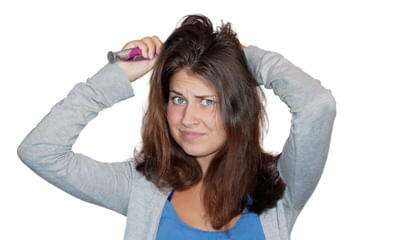Losing Too Much Hair? Here's What You Can Do!
Luscious, healthy hair is undoubtedly one of the most prominent feature that adds charm to your personality. However, a minor or severe form of physical or mental stress and related problems can adversely affect your hair health and growth pattern.
Are you losing too many hair strands in a day?
If yes, then tentatively, how many?
If the number is about 100, then you need not worry, however, if it is beyond 100 you need to get cautious.
On an average, an adult has 100,000 to 150,000 hair and each hair follicle has its own life cycle, and traverses through three phases during its growth phase; anagen (active hair growth takes place), catagen (transitional hair growth), and telogen (resting phase after which the hair sheds off). Hair fall is a normal physiological process in which the hair completes its life cycle and sheds off. However, excessive hair fall is a health concern that needs thorough evaluation and treatment.
Have you heard of telogen effluvium?
Telogen effluvium (TE) also called as hair loss is a common dermatological condition which causes increased shedding of hair. This happens when there is a premature arrest of the growth of hair follicles and these follicles enter into the telogen phase (resting) followed by diffuse thinning of hair on the scalp. In most cases, the hair thins on the top of the scalp compared to the sides and back of the scalp. The hair loss is temporary and the hair soon recovers.
How common is telogen effluvium in India?
Studies suggest that TE is amongst the most common cause of hair loss. It can occur in both males and females. However, it is found to be more common in females.
What are the common causes of telogen effluvium?
Common causes of TE include certain medical condition, stress, pregnancy, crash dieting, nutritional deficiencies, intake of certain medicines, and physical trauma.
A common cause of hair loss in the Indian population is diet. A major proportion of the Indian population consumes a diet lacking essential amino acids, vitamins, and minerals, predisposing the population to this condition. It, therefore, becomes more important to include vital minerals such as zinc, amino acids (such as L-lysine), and vitamins (such as B6 and B12) to your daily diet or to take supplements available in the market.
Are Indians at an increased risk of nutritional deficiencies?
Yes, Indians are at an increased risk of nutritional deficiencies. Several research studies conducted in the past outline a direct association of nutritional deficiencies with hair loss.
In fact, according to a clinical survey published in Indian Medical Gazette, 9 out of 10 people in the country are unable to consume adequate amount of proteins. Working population settled in urban areas have been found to be most commonly affected by protein deficiencies.
How can you ensure healthy and luscious hair?
Simple 7 steps to healthy hair
Volumes of literature support the need for adding nutritional supplements to the diet to avert the occurrence of hair fall. Often TE gets better once the trigger for the condition is taken care of. However, if in case it persists make sure you consult a medical professional at the earliest.
Step 1: It’s all about what you eat (have a BALANCED DIET!!!)
- Considering the fact, that a major part of the Indian population are green eaters and they often run short of essential nutrients, one needs to make a conscious effort to have a balanced and nutrient rich diet.
- Add green leafy vegetables that are an abundant source of iron, zinc, and other vitamins and minerals that are essential for healthy hair growth. Add PROTEIN to your diet. Include milk products, soya products, nuts, fish, lean meat seeds, sprouts, and cereals to your daily diet.
- Opt for foods packed with vitamin E, like almonds, walnuts, or strawberries which improve scalp circulation, as well as vitamin C-rich foods like broccoli, tomatoes, and other citrus fruits.
Step 2: Massage your scalp regularly
Massage has been found to improve the blood circulation to the hair follicles and stimulates hair growth. Try essential oils such as olive oil, castor oil, rosemary oil, and coconut oil to massage your scalp. Warm oil helps penetrate the scalp more effectively. You can also apply hair serums that are enriched with nutrients that nourish the hair and keep it healthy.
Step 3: Choose your SHAMPOO wisely
Watch out for harsh chemicals like parabens, lauryl sulfate, and sodium chloride. Parabens which are used as preservatives in shampoos can mimic as estrogens which lead to hair loss. Lauryl sulfate, an anionic surfactant used in many cleaning and hygiene products, also cause hair fall. You can also apply certain over-the-counter products that help in better penetration of anti-hair fall medications and enhance their action.
Step 4: Get sufficient Vitamin D (Don’t hide from the sun)
Little do we realize that sunlight actually plays a critical role in promoting hair growth. Sunlight helps you get your daily dose of Vitamin D which is helpful in managing hair fall, so don’t hide from it!
Step 5: Say NO to stress
Stress is amongst the key factors governing a happier and healthier you. So, make sure it does not serve as a roadblock in your health.
Eat healthy and bring in basic lifestyle changes in your day to day life to avert the chances of triggered hair fall.
Step 6: Go for hair growth supplements
-Keratin makes up most of our hair strands and amino acids such as cysteine, lysine, arginine, and methionine play a critical role in the formation of the hair strands. The market is loaded with several supplements (oral and topical) that help to provide the hair with essential nutrients and vitamins. You can choose to pick supplements that are a source of vital minerals and vitamins essential for hair growth.
Step 7: Seek help from a dermatologist/ trichologist
- In case your hair fall tends to worsen or does not improve with dietary and lifestyle changes, it is best to consult a dermatologist. He/she will examine your scalp and may suggest certain tests to rule out any underlying cause of hair fall. He/she may also prescribe some topical or oral medications and supplements to help manage hair fall better.
- So, go ahead and try these simple and effective everyday tips to ensure that your hair stays healthy and strong.



+1.svg)
